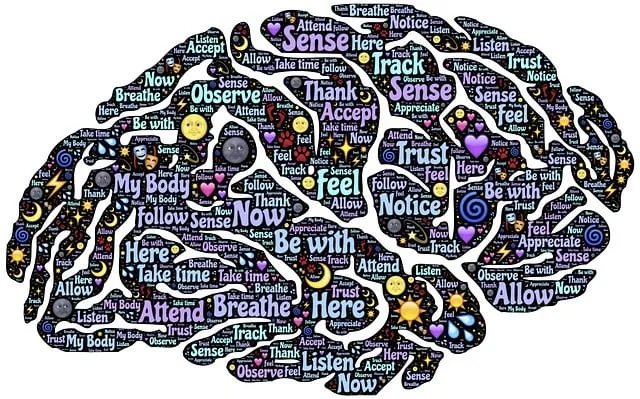The Lafayette Kaiser Permanente (LKP) Mental Health Department is a leading community resource promoting emotional well-being through innovative programs and clinical expertise. Their tailored initiatives, such as Emotional Well-being Promotion Techniques and Community Outreach, focus on individual and community support, reaching underserved areas and improving access to mental health services. Evaluation is crucial for LKP's programs, utilizing both quantitative metrics (symptom reduction, quality of life) and qualitative feedback from clients and healthcare providers to ensure cultural sensitivity and program effectiveness. Key performance indicators track patient satisfaction and clinical outcomes, aiming to reduce provider burnout and implement successful depression prevention strategies. The department's dynamic approach includes regular assessments and stakeholder feedback, ensuring programs like Stress Management Workshops remain optimized for the best mental wellness outcomes in a diverse community.
The Lafayette Kaiser Permanente Mental Health Department plays a pivotal role in promoting community mental wellness, serving as a model for comprehensive program evaluation. This article explores the key components and diverse evaluation methods employed by this renowned department. From qualitative assessments capturing participant experiences to quantitative metrics tracking impact, we delve into strategies for measuring mental health program success. Additionally, we highlight the importance of continuous improvement through feedback loops, ensuring that initiatives evolve based on data-driven insights, fostering a dynamic and effective mental wellness ecosystem within Lafayette Kaiser Permanente.
- Understanding Lafayette Kaiser Permanente Mental Health Department's Role
- Key Components of a Comprehensive Mental Wellness Program Evaluation
- Qualitative Assessment Techniques for Mental Health Interventions
- Quantitative Metrics to Measure the Impact of Mental Wellness Initiatives
- Continuous Improvement: Feedback Loops and Iterative Program Development
Understanding Lafayette Kaiser Permanente Mental Health Department's Role

The Lafayette Kaiser Permanente Mental Health Department plays a pivotal role in fostering emotional well-being within their community. This dedicated department employs a multi-faceted approach, combining clinical expertise with innovative programs to address mental health concerns. With a focus on both individual and community support, they strive to create a network of resources accessible to all.
One notable contribution is the implementation of effective Emotional Well-being Promotion Techniques tailored to diverse populations. Additionally, their Community Outreach Program serves as a game-changer, ensuring that mental health services reach underserved areas. Furthermore, empathy building strategies are woven into their practice, fostering a supportive environment and enhancing patient experiences.
Key Components of a Comprehensive Mental Wellness Program Evaluation

A comprehensive evaluation of mental wellness programs is essential to ensure their effectiveness and adaptability to diverse needs, especially in a setting like the Lafayette Kaiser Permanente mental health department. This process involves several key components that form a holistic view of the program’s impact. Firstly, assessing client outcomes measures the success of interventions through various metrics, including improvements in symptoms, functional abilities, and quality of life. These outcomes provide quantitative data, allowing for evidence-based decisions on program adjustments.
Additionally, gathering feedback from participants and providers through qualitative methods like surveys, interviews, or focus groups offers valuable insights. This feedback highlights cultural sensitivity in mental healthcare practice by understanding individual experiences, preferences, and barriers to care, fostering empathy building strategies that cater to diverse populations. Furthermore, tracking engagement levels and client satisfaction ensures the program aligns with community needs, potentially leading to initiatives focused on self-esteem improvement and overall well-being.
Qualitative Assessment Techniques for Mental Health Interventions

The Lafayette Kaiser Permanente mental health department number highlights the importance of robust evaluation methods in gauging the effectiveness of interventions aimed at improving mental wellness. Qualitative Assessment Techniques play a pivotal role here, offering deep insights into participants’ experiences and perceptions. Methods like in-depth interviews, focus groups, and observer notes allow for exploring individual narratives, uncovering subtle changes in mood management strategies, and understanding how stress management workshops organization impacts overall well-being.
These qualitative approaches are particularly valuable when evaluating complex mental health interventions. They enable a nuanced examination of participants’ interactions with the program, their sense of community within groups, and the overall emotional climate fostered by these initiatives. Moreover, risk assessment for mental health professionals becomes more comprehensive when qualitative data is incorporated, ensuring the safety and efficacy of services provided.
Quantitative Metrics to Measure the Impact of Mental Wellness Initiatives

The evaluation of mental wellness programs within healthcare institutions like Lafayette Kaiser Permanente’s mental health department requires a robust toolkit, with quantitative metrics playing a pivotal role in assessing impact and guiding improvements. Key performance indicators (KPIs) can measure success across various aspects, from patient satisfaction to clinical outcomes. For instance, tracking the number of patients engaging in mental wellness initiatives, along with changes in their symptoms or perceived well-being, provides tangible data for progress.
Among these metrics, reducing healthcare provider burnout rates and depression prevention programs often serve as primary goals. By quantifying the adoption of conflict resolution techniques and other coping strategies within the department, evaluators can determine their effectiveness in fostering a healthier work environment. This data not only highlights successful interventions but also points towards areas needing further attention or refinement, ensuring continuous improvement in mental wellness care delivery.
Continuous Improvement: Feedback Loops and Iterative Program Development

Mental wellness programs are not static; they evolve through continuous improvement, guided by feedback loops and iterative development. The Lafayette Kaiser Permanente mental health department, recognizing this dynamic nature, integrates regular assessments and stakeholder feedback to enhance program effectiveness. By actively collecting input from participants, facilitators, and other key stakeholders, the department identifies areas for improvement and adapts programs accordingly.
This approach fosters a culture of learning and growth, ensuring that initiatives like Stress Management Workshops, Social Skills Training, and Conflict Resolution Techniques remain relevant and impactful. The iterative process allows for refining content, delivery methods, and outcomes measurement, ultimately optimizing the mental wellness journey for all involved.
The evaluation of mental wellness programs is a multifaceted process that involves both qualitative and quantitative methods. By understanding the key components outlined in this article, including those specific to the Lafayette Kaiser Permanente Mental Health Department’s comprehensive approach, organizations can effectively assess and improve their initiatives. Integrating qualitative assessment techniques and quantitative metrics allows for a holistic view of program impact, enabling continuous improvement through iterative development. This strategic evaluation ensures that mental wellness programs not only meet but exceed expectations, ultimately enhancing the well-being of participants.






